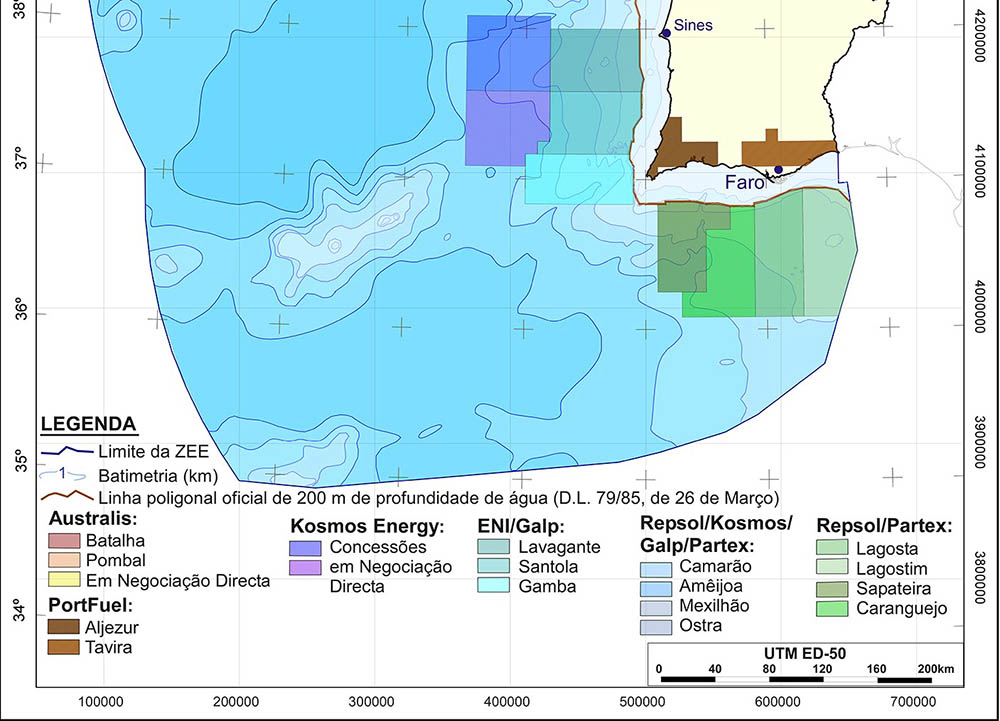 Local authorities in the region do not want to see "the Algarve associated with oil, much less with a process that was anything but transparent", he told the Sul Informação AMAL president Jorge Botelho.
Local authorities in the region do not want to see "the Algarve associated with oil, much less with a process that was anything but transparent", he told the Sul Informação AMAL president Jorge Botelho.
The Algarve Intermunicipal Community, which brings together the 16 municipalities in the region, has repudiated the contracts signed between the State and a company for the extraction of fossil fuels in two land concessions and intends to use "all legal forms" at its disposal to reverse the situation.
The presidents of all Algarve municipalities unanimously approved a public position in which they consider that «the contract that was signed between the Portuguese State and a company in the sector, for the granting of oil prospecting, research, development and production rights in the designated areas by Aljezur and Tavira, it is a situation that exceeds the permissible limits in all respects with regard to the right of access to information, clarification, public discussion and, above all, the respect that local authorities deserve».
Contacted by Sul Informação, Jorge Botelho said that, for now, the mayors will try to understand what is really at stake. "We have already requested urgent meetings with the Government and with the National Entity for the Fuel Market (ENMC), in order to throw a blanket of clarity on this whole matter", he revealed. The meeting with ENMC is scheduled "for the 18th of December, at AMAL".
The "secretism" surrounding the process of hydrocarbon exploration concessions in the Algarve and now also on land are one of the "spots" pointed out by AMAL, which says it wants to demonstrate "to the respective guardians (...) our displeasure, serious doubts, concerns and enormous skepticism about the matter, as well as the contempt since the beginning of the Portuguese State in relation to the Algarve and the Algarve».
«Since 2005, AMAL has been following the process related to the eventual exploration of oil and natural gas in the Algarve, very attentively and particularly concerned about the secrecy surrounding this matter. The constant lack of information either to the municipalities or to the Algarve's Intermunicipal Community, as well as to the Algarve's citizens, on the part of successive Governments is unjustifiable and one of the deadly sins of this entire process», reads in the AMAL note.
Jorge Botelho guarantees that he and his counterparts were not “found nor found” about this process, something they consider even more serious when it comes to explorations “that affect the territory of 14 of the 16 municipalities of the Algarve”. The mayor of Tavira, the municipality that gives its name to one of the concessions granted to the company PortFuel, owned by the Algarve businessman Sousa Cintra, even reveals that he learned of the existence of this company «through the media».
Jorge Botelho adds that the Algarve's mayors do not agree with the concession for the exploration of oil and the like in the region, as they believe it could jeopardize the region's economy, based on tourism. «The development model of the Algarve should be based on clean energy and is not compatible with oil prospecting», defends the mayor of Tavir.
«In the same way, we do not understand and we raise the most serious and well-founded doubts regarding the compatibility of authorized/licensed activities, with the environmental values and biodiversity in presence, namely in the territories of the National Agricultural Reserve, National Ecological Reserve, Rede Natura 2000 and Natural Parks”, add the autracas, in their joint position.
«AMAL now arrogates itself to all legal forms that assist it to counteract ongoing processes, with the aim of reversing them, taking into account the serious consequences that can result from these processes, jeopardizing the quality of life populations and the economy, especially in tourism”, AMAL concluded.


















Comments